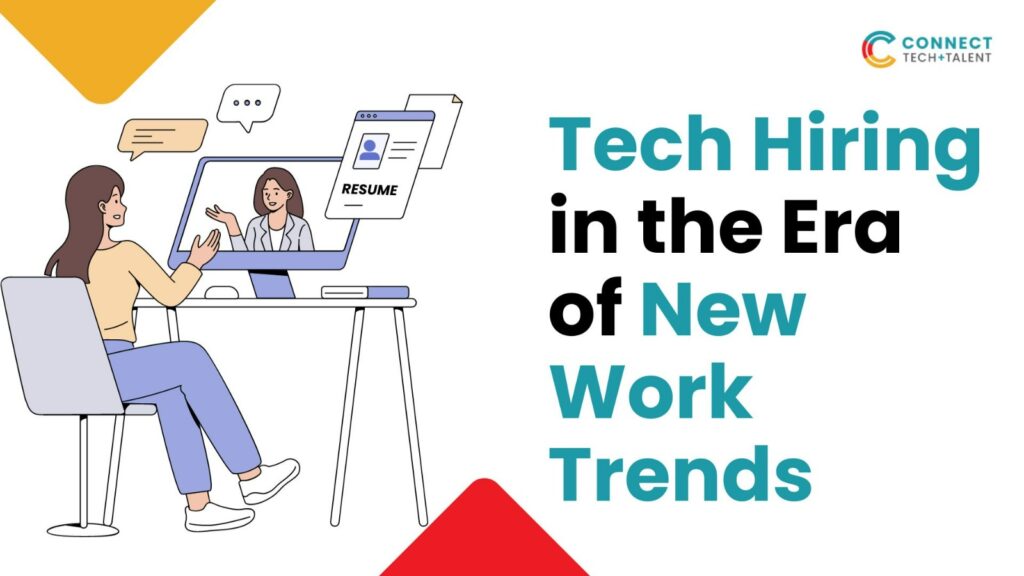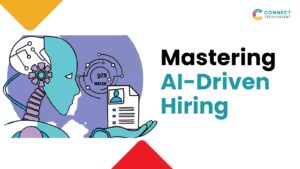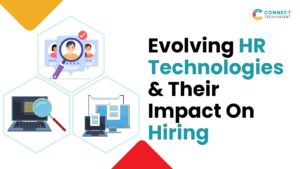In today’s dynamic tech landscape, understanding the shifts and nuances that define the industry is paramount. The world of work has seen a significant metamorphosis, with traditional roles giving way to more tech-centric positions. Contract tech staffing and IT staff augmentation services are at the forefront, adapting to these changes. But it’s not just about the changing nature of jobs.
The rise of generative AI is revolutionizing the job market, promising to reshape how businesses operate and the skills they prioritize. As you delve into this exploration, it’s essential to grasp these transformations and the opportunities they present for both employers and job seekers.
The AI Evolution: How Generative Tech is Shaping the Future of Jobs
Generative AI, a term that’s rapidly gaining prominence, is poised to redefine the tech landscape and the nature of jobs. Here’s a closer look:
-
What is Generative AI?
It’s a subset of artificial intelligence that can produce new content, from text to images. Its capabilities extend from creating lifelike images to generating contextually relevant text.
-
Impact on the Job Market by 2030
According to McKinsey, generative AI might lead to the automation of activities accounting for up to 30% of hours worked. This doesn’t signify job losses but a transformation in the nature of roles.
-
Emerging Job Opportunities
The rise of generative AI will usher in roles centered around AI ethics, AI training, and AI integration. These positions will demand a mix of technical prowess and soft skills.
-
Strategic Hiring Approach
Recruiting firms should recalibrate their strategies, emphasizing candidates with skills that complement AI tools. It’s not merely about the top IT skills but a more comprehensive skill set encompassing adaptability and analytical thinking.
-
Investment in Training
Continuous learning becomes paramount. Encouraging employees to upskill and adapt to the AI-centric environment will be vital.
-
Cultivating a Culture of Innovation
To truly leverage generative AI, it’s essential to nurture a culture where creativity and innovation are celebrated, ensuring businesses tap into the full potential of this ground breaking technology.
In this evolving scenario, being informed and adaptable will be pivotal for success in the realm of tech hiring.
Changing Landscape of Workplace Trends
The world of work is undergoing a seismic shift, with several trends emerging that are reshaping the way businesses operate and individuals approach their careers. Here’s a snapshot of these transformative trends:
1. Quiet Cutting
This refers to the subtle tactics some companies use to encourage employees to leave, often without explicit layoffs. It’s a strategy that can have long-term implications for a company’s reputation and employee morale.
2. Loud Quitting
An increasing number of professionals are publicly announcing their resignations, often on social media platforms. This trend not only highlights individual empowerment but also puts companies under the spotlight, emphasizing the importance of transparent and ethical practices.
3. The Great Resignation
Recent data indicates a surge in employees voluntarily leaving their jobs. Factors like burnout, desire for better work-life balance, and the search for better opportunities are driving this trend. According to a Gallup poll, 48% of America’s working population is actively job hunting or watching for opportunities.
4. The Hybrid Workforce
The pandemic has accelerated the adoption of hybrid work models, where employees balance between remote and in-office work. A study from Gartner suggests that in 2023, over 50% of companies will have adopted a hybrid work model, emphasizing flexibility and employee choice.
5. The Gig Economy
The rise of freelance or contract staffing in tech signifies a shift towards more flexible employment models. Recruiting firms are increasingly looking to tap into this pool of talent, recognizing the value of specialized skills on a project-by-project basis.
Understanding these trends is crucial for businesses and professionals alike, ensuring they remain agile and responsive in a rapidly evolving job market.
How Contract Staffing Fits Into the New Norm
In the evolving tech landscape, the traditional hiring model is being reimagined. Contract staffing, once an alternative, is now becoming a preferred choice for many businesses, especially in the IT sector. Here’s how it’s shaping the new norm:
-
Benefits of Contract Staffing Agencies
Engaging with a contract staffing agency offers businesses the flexibility to scale their workforce based on project demands. It reduces long-term overheads, provides access to a diverse talent pool, and ensures that teams are equipped with specialized skills for specific projects.
-
Understanding IT Staff Augmentation
This approach allows companies to bolster their existing teams with specialized talent on an as-needed basis. It’s a strategy that ensures projects are not stalled due to skill gaps, and businesses can remain agile in response to market demands.
-
Seeking the Best
Recruiting firms are on a constant lookout for the top IT skills. With the tech world evolving at breakneck speed, there’s a growing demand for skills in areas like AI, machine learning, data analytics, and cybersecurity. Contract tech staffing allows firms to access these skills swiftly, ensuring they remain competitive.
-
The Future of Tech Hiring
With the benefits it offers, from cost savings to agility, contract staffing services are poised to play an even more significant role in tech hiring. As projects become more complex and technology continues to advance, the ability to quickly onboard specialized talent will be invaluable.
Embracing this shift towards contract staffing is not just about adapting to the new norm; it’s about leveraging it for success in the tech world.
Adapting to the Trends: Strategies for Tech Hiring Success
In this fast-paced world of tech, hiring strategies need to be as dynamic as the industry itself. As the landscape evolves, businesses must adapt to ensure they attract and retain the best talent. Here’s how to navigate this journey to hiring success:
-
Transparency is Key
In today’s digital age, candidates are more informed than ever. A transparent hiring process, where roles, expectations, and growth opportunities are clearly defined, can set a hiring agency apart. It builds trust and showcases a company’s commitment to integrity.
-
Competitive Offerings
Beyond the pay check, professionals are seeking workplaces that value them. Offering competitive packages, which include benefits, learning opportunities, and growth prospects, can make a difference. Coupled with a positive work culture that promotes collaboration and innovation, it can be a game-changer in attracting top talent.
-
Flexibility in the Forefront
The traditional 9-to-5 is being redefined. Embracing flexibility, be it through remote work options or diverse work schedules, is no longer a perk but a necessity. Contract staffing services are leading the way in this, showcasing the benefits of a flexible approach to work.
Incorporating these strategies can make the difference between a good hiring process and a great one. In the end, it’s about creating an environment where talent feels valued, understood, and excited to contribute.
Conclusion
Tech hiring is in a state of flux, shaped by transformative work trends and the rapid advancements in technology. From the rise of generative AI to the changing dynamics of the workplace, the rules of recruitment are being rewritten. The emergence of contract staffing, the importance of adaptability, and the need for a strategic approach in hiring are more pronounced than ever.
For recruiters, this era presents both challenges and opportunities. Staying static is not an option. It’s imperative to stay ahead of the curve, continuously learning and adapting to the ever-changing environment. By embracing transparency, fostering a culture of innovation, and prioritizing flexibility, recruiters can ensure they not only attract but also retain the best talent in the industry. In this journey of evolution, those who adapt will thrive, setting new benchmarks for success in tech hiring.




